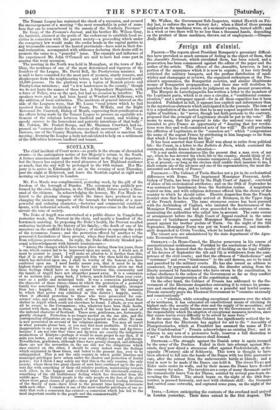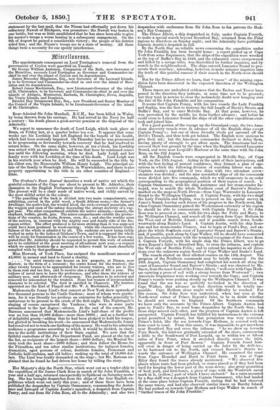lorttgo nut Colonial.
Fasivcs..—The reports about President Bonaparte's pecuniary difficul- ties have provoked so much soreness of feeling in the object of them, that the Assemble:e Nationale, which circulated them, has been seized, and a prosecution has been commenced against the editor of the paper and the author of the article. This offence of the Assemblie, however, is but a portion of the annoyance which it is now to expiate ; it has very freely criticized the military banquets, and the profuse distribution of sand- wiches and champagne at reviews, the organized enthusiasm at the Pre- sident's appearances, the Bonapartist societies, and similar illegitimate means of Bonapartist propagandism ; and these sins will doubtless be punished when the court awards its judgment on the present prosecution. The Marquis de Larochejaquelin has written a letter to the members of the Legitimist party, which is at once a circular, a "confidential commu- nication," and a newspaper appeal—for in all these capacities has it been heralded. Published in full, it appears less explicit and informatory than in the mysterious abstracts which anticipated it in the journals. The sum of it is a repudiation of the notion that he in any respect negatived the sacred rights of tradition ; he "never, though bad faith pretends to the contrary, proposed that the principle of Legitimacy should be put to the vote." He seems to mean, that his proposal to take the national voice was only intended to give France an opportunity of " denying that her revolu- tions were free and well-considered acts of her will.' He still proclaims the affliction of Legitimists at the "senseless act" which "compromises the name of the august Prince by attributing to him language so far from that which I have heard from his lips." It has been asserted that Count Mole was about to retire from political life : the Count, in a letter to the Bulletin de Paris, which contained the statement, stoutly denies the intention— "It is not under circumstances like the present that a man even of my age, when he has devoted his whole life to the country, should think of re- pose. So long as my strength remains unimpaired,—and, thank God, I feel it so at present,—so long as the electors shall confide their mandate to me, I shall remain one of the advisers and one of the representatives, the most dis- interested and devoted, of France."
PIEDMONT.—The Cabinet of Turin flinches not a jot in its ecclesiastical differences with Rome. The imprisoned Monsignor Franzoni, Arch- bishop of Turin, has been tried by the High Court of Appeal ; convicted of abuse of his ecclesiastical attributes ; and on the 20th of September he was sentenced to banishment from the Sardinian realms. A magistrate waited on him, and with religious deference offered him the choice of the country to which he should retire. Electric despatches from the French frontier state that he has already arrived at Briancon, in the Upper Alps of the French frontier. The same strenuous course has been pursued with the Archbishop of Cagliari, who imitated the fractiousness of the Monsignor Franzoni, and had even proceeded to the extreme of excom- municating the authorities who called him to:account The same course of arraignment before the High Court of Appeal resulted in the same sentence of banishment against Monsignor Marongiu Nurra that was passed against his brother prelate of Turin. On the night of the 23d September, Monsignor Nurra was put on board a steamer, and immedi- ately despatched to Civita Vecchia, where he landed next day.
The vacant sees are administered by the state department of the Apos- tolic Economist-General.
GERMANY.—III Hesse-Cassel, the Elector perseveres in his course of unconstitutional recklessness. Fortified by the resolutions of the Frank- fort Diet, he has decreed that the faculty of deciding on the legal validity of his decrees of September the 4th and 7th is withdrawn from the com- petence of the civil courts ; and that the offences of "disobedience" and "resistance" and even " hinderance" to the said decrees, are to be tried and punished by the military courts. He has also issued an address to counteract, by arguments and reasoning, the disorder arising from the liberty assumed by functionaries who have sworn to the constitution, to refuse obedience to the orders of the Government so far as they conflict with individual interpretation of the constitution oath.
On the other hand, the Cabinet of Prussia has addressed to the Go- vernment of the Electorate despatches entreating it to retrace its prema- ture and onesided steps, and to reenter on a peaceful and lawful course. Prussia earnestly prays the Electoral Government to "examine anxiously and conscientiously - - - - " whether, while extending exceptional measures over the whole of its territories, it has exhausted all constitutional means of attaining its highest end—the security of the state and the supply of its necessities; and whether thus it has really become necessary for the Government to incur all the responsibility which the adoption of exceptional measures involves, since that course leaves every difficulty to be solved by mere force." At the same time, the Berlin Cabinet has significantly noticed the in- formation that the Electorate has applied for aid to the " Assembly of Plenipotentiaries, which at Frankfort has assumed the name of D:et of the Confederation" : Prussia acknowledges no existing Diet; and in relation to any acts of a pretensive body, reserves a full discretion to " act" as the future circumstances shall demand.
DENEARK.—The struggle against the Danish army is again resumed by the army of the Duchies. Foiled in their late attempt against Mis- sunde, they now direct a strenuous effort against Frederichstadt, at the opposite (Western) side of Schleswig. This town is thought to have been allowed to fall. into the hands of the Danes with too little preventive care, after the retreat from the unfavourable battle at Idstedt ; and a trial is now to be made if the Danes can hold it. The rivers Trrea and Eider unite under its walls, and by their means the Danes have flioded the country for miles. The invaders are a corps of many thousands under the romantically brave Von der Thann, assisted by several gun-boats de- scending the Eider. The attack began on the night of the 28th Sep- tember, is pressed furiously, and met with obstinate skill: the • Germans had carried some outworks, and captured some guns, on the night of the 30th.
lwrim.—Letters anticipating the contents of the overland mail arrived in London yesterday. Their dates extend to the 31st August. The
statement by the last mail, that the Nizam had effectually put down his refractory Nawab of Elichpore, was premature : the Nawab was beaten in one battle, but was so little annihilated that he has since been able to give his master's troops a worse beating in a subsequent engagement. On the 9th of August he gained a considerable victory; the people of his district aided him; and the Nizam's troops are in a state of mutiny. All these things bode a necessity for our speedy interfereice.



























 Previous page
Previous page